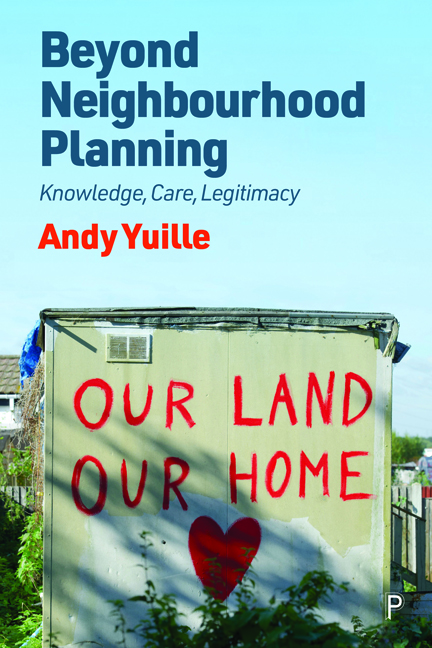Book contents
- Frontmatter
- Contents
- List of figures and table
- Acknowledgements
- Preface
- 1 Introduction: Neighbourhood planners and the turn to participation
- 2 Planning, participation and democratisation
- 3 Knowledge, politics and care: perspectives from Science and Technology Studies
- 4 Neighbourhoods, identity and legitimacy
- 5 Experience, evidence and examination
- 6 Expertise, agency and power
- 7 Care and concern
- 8 Conclusion: Neighbourhood planning and beyond
- Notes
- References
- Index
3 - Knowledge, politics and care: perspectives from Science and Technology Studies
Published online by Cambridge University Press: 20 January 2024
- Frontmatter
- Contents
- List of figures and table
- Acknowledgements
- Preface
- 1 Introduction: Neighbourhood planners and the turn to participation
- 2 Planning, participation and democratisation
- 3 Knowledge, politics and care: perspectives from Science and Technology Studies
- 4 Neighbourhoods, identity and legitimacy
- 5 Experience, evidence and examination
- 6 Expertise, agency and power
- 7 Care and concern
- 8 Conclusion: Neighbourhood planning and beyond
- Notes
- References
- Index
Summary
Planning documents, from maps, to models, to GIS, to plans themselves, do in fact all tell a story … there is no such thing as mere description, or pure facts. There is always an author … who is choosing which facts are relevant, what to describe, what to count, and in the assembling of these facts a story is shaped.
Sandercock (2003: 21)Introduction
It is frequently repeated that planning is much an art as a science. So why look at it through the lens of Science and Technology Studies (STS)? In brief, and as I will develop throughout this chapter, STS concepts and approaches are particularly well-suited to help us think through the kinds of issues raised by planning scholar Leonie Sandercock in the opening quotation. Sandercock highlights that ‘the facts’ are never just that, never simply objective truths standing apart from interpretation or value judgements. And by the same token, evidence and policy are never as clearly separated as conventional models of planning would have us believe – as a minimum, because the evidence is always shaped by an author telling a story, when other stories could also be told, and policy is shaped by which stories are made visible in policy-making processes. STS methodologies open up questions of fact and value, of how facts are made and how stories are told with and about them, of whose knowledge is trusted, of how decisions about what is relevant and what is important are shaped, of what and who should be counted and how.
As discussed in Chapter 1, interest in participatory processes and deliberative democracy has flourished over the past decades. STS scholars have made a significant contribution to this ‘participatory turn’, both as advocates and critics (such as Fiorino, 1990; Latour, 2004a; Wynne, 2007; Callon et al, 2009; Marres, 2012; Chilvers and Kearnes, 2016). They have mobilised powerful arguments for increasing public engagement and plurality in making evidence and policy, in order to ‘uphold the standards of democratic society; test the framing and direction of expert-led processes; subject institutional interests to public scrutiny; establish cultural bases for knowledge and decision making; and enhance civic capacity to reflect on the challenges of modernity’ (Leach et al, 2005: 38).
- Type
- Chapter
- Information
- Beyond Neighbourhood PlanningKnowledge, Care, Legitimacy, pp. 61 - 89Publisher: Bristol University PressPrint publication year: 2023



